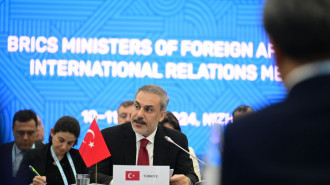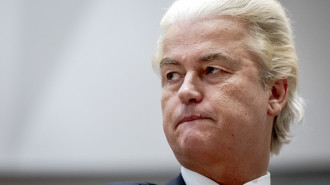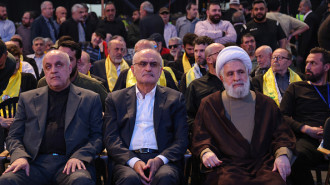'Bloodbath" in Aleppo as Syrian regime advance
Syrian regime forces advanced on the battleground city of Aleppo on Friday, backed by a Russian air campaign that a monitor said has killed more than 3,800 civilians in the past year.
Doctors Without Borders (MSF) - which operates medical facilities in Syria - accused the regime and its ally Moscow of provoking a "bloodbath" in the city.
It said the eastern rebel-held portion had become "a giant kill box".
Syria's army was advancing on two fronts in Aleppo, as talks between key players Washington and Moscow appeared on the verge of collapse.
Damascus' bid to recapture all of the divided city prompted the UN to warn of "a humanitarian catastrophe".
Just over a week after it announced an operation to recapture all of Aleppo, the army was advancing both in northern and central Aleppo, according to the Syrian Observatory for Human Rights monitor and Syrian state media.
In the north, it recaptured the Handarat former Palestinian refugee camp, as well as the old Kindi hospital, said Observatory director Rami Abdel Rahman.
Rebels had held the hospital since 2013 and capturing it allows regime forces to threaten the opposition-held Heluk and Haydariyeh neighbourhoods in northeast Aleppo.
"The regime's strategy is to chip away until it reaches the heart of the rebel-held areas," Abdel Rahman said.
Barbarous' strikes
In Central Aleppo meanwhile, fierce clashes shook the Suleiman al-Halabi neighbourhood, which is divided by the frontline that separates the rebel-held east and regime-held West.
The army is seeking to capture the opposition-held part of the district and advance to the main water supply station for the regime-controlled part of Aleppo which is located in the neighbourhood.
Syrian state TV said eight civilians had been killed and 35 wounded by rocket fire on the government-held part of Suleiman al-Halabi and neighbouring Midan district.
The Observatory and an AFP correspondent on the ground said air raid on Friday were focused on the battlefield, unlike in previous days, which had seen heavy bombardment of civilian areas.
Since the army operation began, Damascus and Moscow have pounded east Aleppo with air raids, barrel bomb attacks and artillery fire.
The assault has levelled apartment blocks and put hospitals out of service, creating a humanitarian catastrophe in opposition areas that have been under siege for most of the past two months.
It has been some of the worst violence since the March 2011 beginning of the conflict, which has killed more than 300,000 people and displaced over half the population.
US President Barack Obama and German Chancellor Angela Merkel on Thursday condemned what they called "barbarous" Russian and Syrian regime air strikes on Aleppo.
And US Secretary of State John Kerry said Washington was "on the verge of suspending the discussion" with Russia on Syria because of the ongoing assault in Aleppo.
"It's irrational in the context of the kind of bombing taking place, to be sitting there, tyring to take things seriously," he said.
A giant kill box
Moscow is a key ally of President Bashar al-Assad and began a military campaign to bolster his forces last September that has killed more than 9,300 people so far, according to the Observatory.
That figure includes 3,804 civilians and more than 5,500 jihadist and rebel fighters, according to the monitor.
At least 20,000 civilians have been wounded in the Russian raids, it said.
The Observatory - which relies on a network of sources inside Syria for its information - says it determines what planes carried out raids according to their type, location, flight patterns and the munitions involved.
Moscow said Thursday that it would continue its bombing campaign in Syria, despite Washington's threat and international concern over the situation in Aleppo.
"Bombs are raining from Syria-led coalition planes and the whole of east Aleppo has become a giant kill box," MSF director of operations Xisco Villalonga said in a statement on Friday.
"The Syrian government must stop the indiscriminate bombing, and Russia as an indispensable political and military ally of Syria has the responsibility to exert the pressure to stop this," he said.
UN aid chief Stephen O'Brien on Thursday told the Security Council that Aleppo was descending into the "merciless abyss of a humanitarian catastrophe unlike any we have witnessed so far in Syria."
Save the Children meanwhile said Friday that the use of bunker-busting bombs meant it would be too dangerous for children to return to school this weekend even to underground classrooms.
The "ferocious assault" on Aleppo could deprive almost 100,000 school-age children of an education, said the charity, which supports 13 schools in the city, eight of them underground.







 Follow the Middle East's top stories in English at The New Arab on Google News
Follow the Middle East's top stories in English at The New Arab on Google News


